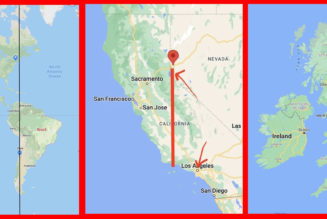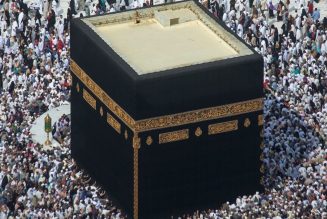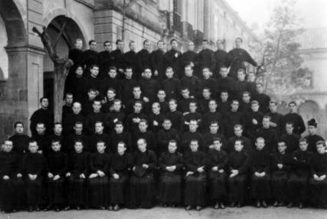Editor’s note: This is the first of a two-part interview with Israel’s Ambassador to the Holy See, Raphael Schutz.
ROME – Days after two women were killed at the Catholic parish in Gaza, with local church authorities pinning blame on IDF forces, Israel’s Vatican ambassador has denied any intentional wrongdoing and has hit back against allegations of inflicting willful harm.
On Dec. 16 mother and daughter Nahida and Samar were shot and killed on the grounds of Holy Family parish in Gaza, and the convent belonging to the Missionaries of Charity attached to the parish was also hit, destroying the generator used to power medical equipment aiding the 57 disabled persons in their care.
In the wake of the incident, the Latin Patriarchate of Jerusalem issued a fiery statement pinning the blame on Israeli military and saying the women had been killed “in cold blood.”
RELATED: Latin Patriarchate says IDF killed women at Gaza parish ‘in cold blood’
A Dec. 19 statement published by the Israeli Embassy to the Holy See said an initial review found that Israeli troops had been operating in the area of the parish when the incident occurred, and the matter was still being investigated.
Speaking to Crux, Raphael Schutz, Israel’s ambassador to the Holy See said, “it might be true that the women were shot by IDF forces, although this has not been 100 percent established, but even if this is true, this has not been done by malice, or intentionally, it was a mistake like others during the war.”
“In this context, I find it very annoying that the Latin Patriarchate in Jerusalem very fast, a few hours after the incident, without an inquiry, lashed into publishing a text naming Israel as a country of murder, the IDF as murderers in ‘cold blood,’ which is basically a blood libel. Nobody in Israel does that intentionally,” he said.
Schutz also responded to Pope Francis’s description of the Gaza war as “terrorism,” a term the pontiff used again during his Sunday Angelus address, and he offered an update on the situation of the Israeli hostages who remain in captivity after being abducted during Hamas’s Oct. 7 military offensive on Israel.
He also spoke of a meeting Pope Francis had last month with the family members of some of the hostages, the possibility of another ceasefire, a recent meeting between the Vatican’s Secretary of State with members of the Arab League, and the Vatican’s repeated calls for a two-state solution.
Please read below for excerpts of Crux’s interview with Ambassador Raphael Schutz:
Crux: To begin, I would first like to address the incident that happened at the Catholic parish in Gaza. The patriarchate has said that the IDF is responsible for the killing of two women there and for the attack on the convent attached to the parish. What is your understanding of what happened?
Schutz: First, I would say that as an overall principle, all victims since October 7 are victims of Hamas, because Hamas is the entity that ignited the war with their brutal attack on Israel. What Israel does is conduct a war of self-defense with the aim at the end of the day to make the Gaza Strip and also other areas of Israel safe and secure for our population, which is not the situation right now.
Coming to this tragic incident of the two women who were shot and killed, I would say that tragedies like that are part of a war. One day before this happened, this happened on a Saturday, and on Friday IDF forces by mistake killed three of the hostages who managed to run away and try to surrender but were perceived as Hamas and were shot and killed, which for us was a huge tragedy. Those people spent 70 days in captivity, and when they managed to run away, they were killed by us. So, it might be true technically that the women were shot by IDF forces, although this has not been 100 percent established, but even if this is true, this has not been done by malice, or intentionally, it was a mistake like others during the war.
In this context, I find it very annoying that the Latin Patriarchate in Jerusalem very fast, a few hours after the incident, without an inquiry, lashed into publishing a text naming Israel as a country of murder, the IDF as murderers in ‘cold blood,’ which is basically a blood libel. Nobody in Israel does that intentionally. Also, we remember that at the beginning of the war there was an attack on a hospital and Israel was blamed, but later it was found out that it wasn’t Israel, but a local militia that fired. So, it might be that the IDF killed the two women: Terrible, tragic, not intentional.
Regarding the tone of that statement from the patriarchate, what does that signal in terms of relations with them? Have relations become difficult because of this war?
Again, it’s terrible. I don’t know why they took the liberty of using this language. It should be upon them to give this answer. I also didn’t hear any clarification, not from them, not from any other element. So, what I can only express is my anger, my dismay, my disappointment for this easygoing, superficial use of words when it comes to this incident.
Pope Francis has intervened multiple times on the current war in Gaza. On several occasions, including this past Sunday during his noontime Angelus address, he has referred to the war as ‘terrorism.’ What is your reaction to this? Are you bothered by the tone the Holy Father has taken?
There are two elements of comments that I would like to make. One is specific to using the word ‘terrorism.’ I would say that, to the best of my knowledge, no responsible leader in the free world, I’m not speaking about Iran or players like that, have called our war of self-defense terrorism. There might be criticism, there might be sometimes even legitimate criticism to this or that action, but as a whole, the leaders of the free world accepted that Israel is exercising its right to self-defense and even if there was criticism, no one called it terrorism. So, the question is if all the leaders of the free world are mistaken? This is my first comment.
My second comment is regarding the framing of the whole issue as the ‘war in Gaza,’ which is part of what I call the ‘shallow discourse’ around it, because from Israel’s perspective, this is not a war in Gaza. Israel has been attacked on October 7th, and since then there are at least four fronts: We have an ongoing war in medium intensity waged from Lebanon, performed by Hezbollah; we have random rockets and missiles launched from Syria by local forces; and we have the Houthi’s from Yemen declaring a war on Israel without provocation, we have nothing to do with the Houthi’s, (who are) trying to block the international naval movement of merchandise by ships in the Red Sea.
For us it’s a war on at least four fronts. So, calling it ‘the war in Gaza’ is ignoring the real problem and limiting the scope of the threat that Israel is facing.
What impact would you say the pope’s words have when he speaks out the way he has? How far does his voice resound?
The pope is the pope, when he comes out and speaks people listen. He has the international unique authority that he has, and this is why what he says is important, because people listen and hear.
I also wanted to ask you for an update on the status of the hostages. How many have been freed? How many are still in captivity? How close do you think you are to getting everyone home?
As far as I know, the initial number that was taken on October seventh was around 250. Right now, the number we know who are in captivity is around 130, which is about half. Unfortunately, we know that some of them are not alive anymore. Hamas holds bodies, corpses. I cannot tell you how many. Most of the women were released and also most of the children, but we know for a fact that at least two babies, one even less than one year old are still there. They were taken alive and have not been released, and we don’t know if they are still alive. Their mother also has not come back. A number of other women are still in captivity, and this is why the first pause came to an end, because Hamas did not release the women that we agreed upon.
Now I understand that there are negotiations to reach another agreement. There was a conversation in Warsaw, a meeting between the head of the Mossad, the head of the CIA, and the Prime Minister of Qatar, but until we see it, we don’t know. Yesterday some jihadists released some videos of two of the hostages, one of them in his late 40s and another one in his late 70s, and the day before, Hamas released a video of three of the hostages, men in their 70s and 80s. They all look very bad; they don’t receive their medicines. The hostages released have told stories of very difficult conditions of captivity, so there is of course huge anxiety about what might happen with the hostages that are still alive.
Do you see the potential for another opening for even a brief ceasefire, for the release of hostages or to provide humanitarian aid, in the near future?
I don’t know. Humanitarian aid is pouring into the Gaza Strip every day, this is happening as we speak, even though the promise to have the hostages visited by the Red Cross has not been kept. Like you, I read the news about some conversations right now regarding the possibility of releasing more hostages. There are two schools of thought, if you like, in Israel. A lot of people in the army, in leadership, they say only the military pressure that we exercise over Hamas made possible the first round of the release of hostages until now, so we have to keep the pressure.
Opening a bracket, I can tell you that among the families that met the pope, at least two were later identified as (having been) killed. I spoke with the two families on the phone later on. Some of them came back, and some are yet unknown. So, the other school of thought is that with each passing day, the chance of bringing them home alive becomes smaller, so the priority now should be given to this issue, bringing back the hostages by negotiation, and only then bring the war back to first priority, to bring down the Hamas military capacity.
It’s a terrible dilemma and I cannot tell you that I take a stance, but these are the two ways of looking at it in the Israeli public opinion and among the Israeli leadership.
Regarding that meeting that the pope had with the families of the hostages, what did that meeting mean to the families and to Israel?
Some of the families, when they came out of the meeting, spoke positively, saying that the pope has shown a lot of empathy and promised to do what he can in order to help. Other family members were a little bit disappointed because the meeting was very short, it was about 20 minutes and there were 12 people and not everybody managed to speak, but the message came through, even for those who didn’t have the time to say a word.
Basically, it was about the hope that the pope together with others in the international arena can make a difference. Of course, I hope he still can with the remaining ones. The impression was very positive on the note that he feels for them, that he cares, and he said explicitly that he would like to help with what he can. We know that Hamas are not exactly hearing what the pope has to say, but Hamas speaks with Qatar and Qatar has some leverage, or some other countries might have some leverage too, and if the pope speaks with them, Qatar then indirectly, at least, might be of help.
Follow Elise Ann Allen on X: @eliseannallen







